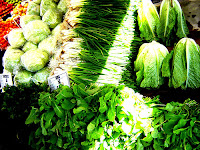Should You Buy Organic Produce
 Organic everything is a huge business, especially now that Wal-Mart has jumped on the bandwagon. If you are one of the average American's who don't shop regularly at Whole
Organic everything is a huge business, especially now that Wal-Mart has jumped on the bandwagon. If you are one of the average American's who don't shop regularly at Whole Paycheck Foods... The question is, are there actual benefits to eating organic and if you can't afford to eat all your produce organic, then where will you get the most bang for your buck?
Money Magazine recently ran an article that explained which fruits and vegetables are the worst offenders as far as pesticides are concerned. Since I currently can't find the magazine, I tracked down a similar list via Google at the Environmental Working Group. I have recreated the list below. The data group has also posted their data set online if you are skeptical about the findings. Although the Money Magazine list wasn't as detailed, from what I remember the results were similar.
The Full List: 43 Fruits & Veggies
| RANK | FRUIT OR VEGGIE | SCORE |
| 1 (worst) | Peaches | 100 (highest pesticide load) |
| 2 | Apples | 96 |
| 3 | Sweet Bell Peppers | 86 |
| 4 | Celery | 85 |
| 5 | Nectarines | 84 |
| 6 | Strawberries | 83 |
| 7 | Cherries | 75 |
| 8 | Lettuce | 69 |
| 9 | Grapes - Imported | 68 |
| 10 | Pears | 65 |
| 11 | Spinach | 60 |
| 12 | Potatoes | 58 |
| 13 | Carrots | 57 |
| 14 | Green Beans | 55 |
| 15 | Hot Peppers | 53 |
| 16 | Cucumbers | 52 |
| 17 | Raspberries | 47 |
| 18 | Plums | 46 |
| 19 | Oranges | 46 |
| 20 | Grapes-Domestic | 46 |
| 21 | Cauliflower | 39 |
| 22 | Tangerine | 38 |
| 23 | Mushrooms | 37 |
| 24 | Cantaloupe | 34 |
| 25 | Lemon | 31 |
| 26 | Honeydew Melon | 31 |
| 27 | Grapefruit | 31 |
| 28 | Winter Squash | 31 |
| 29 | Tomatoes | 30 |
| 30 | Sweet Potatoes | 30 |
| 31 | Watermelon | 25 |
| 32 | Blueberries | 24 |
| 33 | Papaya | 21 |
| 34 | Eggplant | 19 |
| 35 | Broccoli | 18 |
| 36 | Cabbage | 17 |
| 37 | Bananas | 16 |
| 38 | Kiwi | 14 |
| 39 | Asparagus | 11 |
| 40 | Sweet Peas-Frozen | 11 |
| 41 | Mango | 9 |
| 42 | Pineapples | 7 |
| 43 | Sweet Corn-Frozen | 2 |
| 44 | Avocado | 1 |
| 45 (best) | Onions | 1 (lowest pesticide load) |
The results suggest what you may have already guessed. The fruits and vegetables with the thinest skins (like peaches, apples and strawberries) are more likely to be contaminated with the most pesticides. Whether you find it helpful or not, it's nice to know how potentially bad the produce you are buying is before your next trip to the store.
Link:
Image Creative Commons R@punsell



